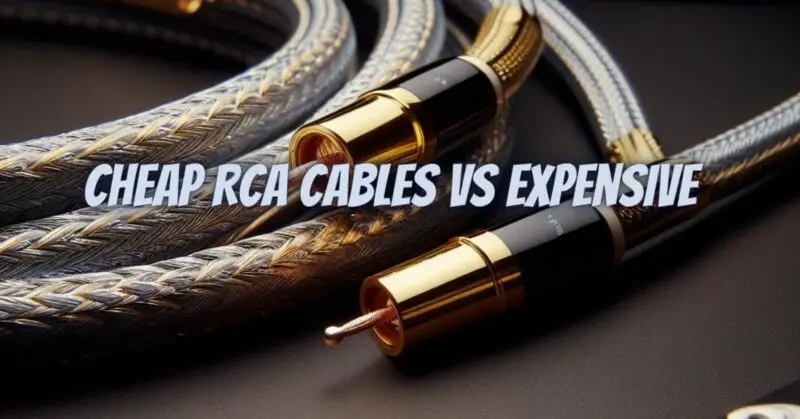RCA cables are a common sight in any home with an audio system. They’re used to connect components like turntables, CD players, and receivers. But with so many different RCA cables on the market, it can be tough to know which ones are worth buying.
In this article, we’ll take a look at the differences between cheap and expensive RCA cables, and help you decide whether or not it’s worth paying more.
What are RCA cables?
RCA cables are a type of audio cable that uses two or three conductors to transmit audio signals. The conductors are typically made of copper, and they’re surrounded by a shielding material to reduce noise and interference.
RCA cables are used to connect a variety of audio components, including:
- Turntables
- CD players
- Receivers
- Amplifiers
- Speakers
- Subwoofers
What’s the difference between cheap and expensive RCA cables?
The main difference between cheap and expensive RCA cables is the quality of the materials and construction. Cheap RCA cables often use lower-quality copper conductors and thinner shielding material. This can lead to noise and interference, especially with longer cable runs.
Expensive RCA cables, on the other hand, typically use high-quality copper conductors and dense shielding material. This helps to reduce noise and interference, and it can also improve the sound quality of your audio system.
Is it worth paying more for expensive RCA cables?
Whether or not it’s worth paying more for expensive RCA cables depends on a few factors, including:
- The quality of your audio system: If you have a high-end audio system, then you’ll likely benefit from using high-quality RCA cables. Cheap RCA cables can introduce noise and interference, which can degrade the sound quality of your system.
- The length of your cable runs: If you’re using long RCA cables, then it’s important to choose a high-quality cable. Cheap RCA cables are more susceptible to noise and interference, especially with longer cable runs.
- The type of music you listen to: Some types of music, such as classical music and jazz, are more sensitive to noise and interference than others. If you listen to these types of music, then it’s worth investing in high-quality RCA cables.
How to choose the right RCA cables for you
When choosing RCA cables, it’s important to consider the following factors:
- Length: Make sure to choose RCA cables that are the appropriate length for your needs.
- Quality: Choose RCA cables that are made with high-quality materials and construction.
- Price: RCA cables can range in price from a few dollars to over $100 per pair. Set a budget before you start shopping, and choose RCA cables that fit your budget and needs.
So, is it worth paying more for expensive RCA cables? It depends on your specific needs and budget. If you have a high-end audio system, need long cable runs, or listen to classical or jazz music, then it’s worth investing in high-quality RCA cables. However, if you have a budget audio system, short cable runs, and listen to pop or rock music, then you may be able to get away with using cheaper RCA cables.
Here are a few tips for getting the most out of your RCA cables:
- Use the shortest RCA cables possible. This will help to reduce noise and interference.
- Make sure that your RCA cables are properly connected. A loose connection can cause noise and interference.
- Avoid running your RCA cables parallel to power cords. This can also cause noise and interference.
- If you’re using long RCA cables, consider using a signal booster. This will help to amplify the signal and reduce noise and interference.


